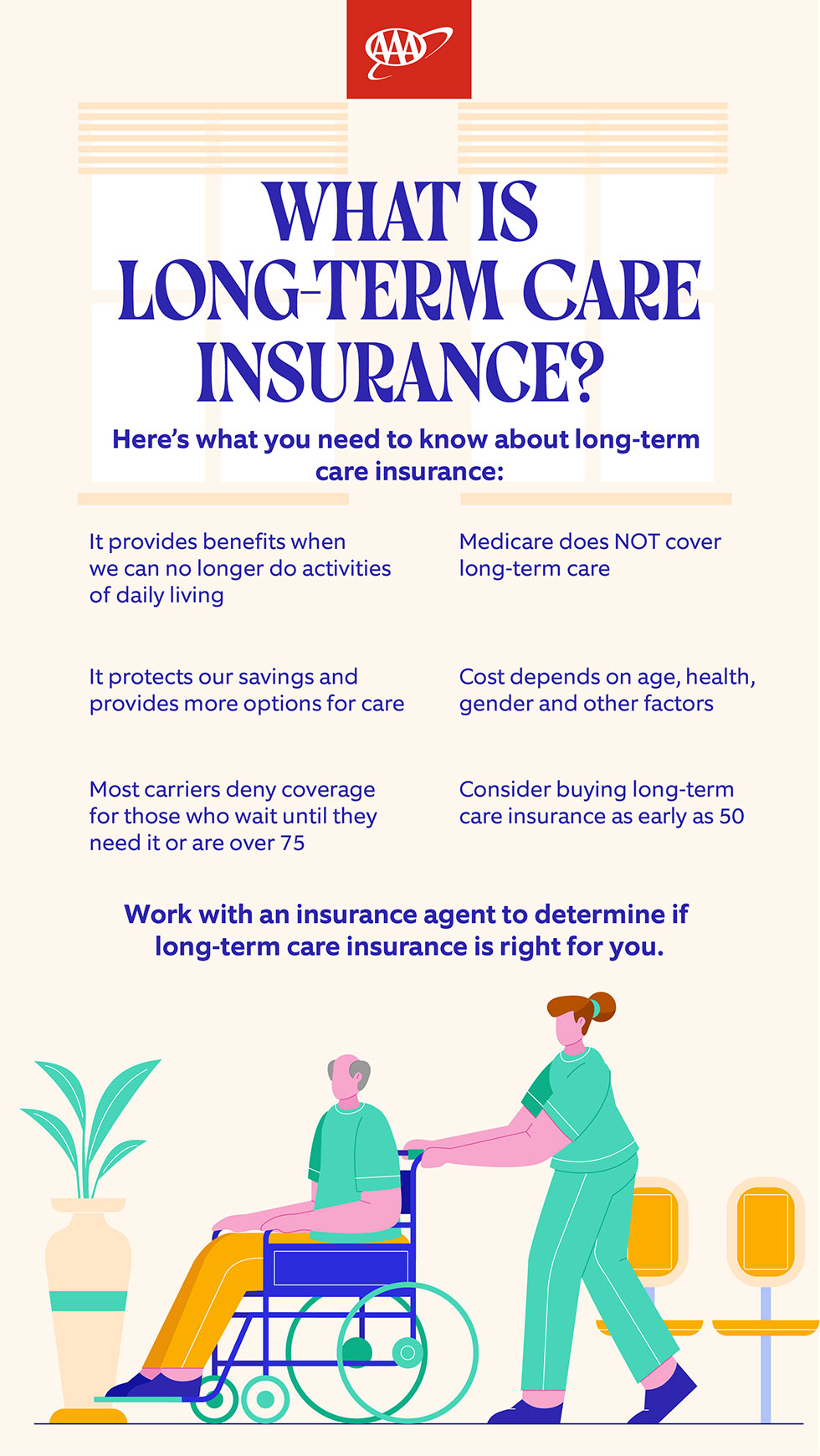What Is Long-Term Care Insurance
Long-term care insurance: how it works, how to get it, how much does it cost, and more


Long-term care involves a wide variety of medical and non-medical services to help people live as independently and safely as possible. These services can be provided at home, in an assisted living facility, or in nursing homes. Individuals of any age and disability may need long term care support, but it can be especially beneficial for people as they age.

It’s a common misconception that Medicare (the federal health insurance program for people ages 65 and older or those with certain disabilities) will cover long term care if necessary. However, Medicare does not provide long term care coverage and you’d be responsible for paying those costs out-of-pocket.
These gaps in coverage are why many people turn to long term care (LTC) insurance. While not necessary for everyone, having a plan and understanding your options is important. Read on to learn more.

HOW DOES LONG TERM CARE INSURANCE WORK?
Most long term care policies provide benefits when you can’t do at least 2 out of 6 “activities of daily living,” such as bathing, dressing, eating, toileting, getting in and out of bed or a chair, and others, or if you suffer from dementia or other cognitive impairment.
Once you find a policy:
- Fill out an application and answer health questions. In some cases, you may be asked to share your medical records or participate in a phone or in-person interview.
- Choose the coverage you want.
- Once approved and the policy is issued, start paying monthly premiums.
When you need care and want to make a claim, the insurance company will review your medical records and documents from your provider and in some cases, they may do an additional evaluation. The company will also approve your plan of care before approving a claim.
Once coverage kicks in, it’s typically capped at a certain amount daily or monthly, up to a lifetime maximum or certain number of years. To understand this, as well as what conditions are actually covered, be sure to carefully review your particular policy and ask your insurance agent or company questions you may have.
Note that with most policies, you’ll have an “elimination period,” which is a certain amount of time you’ll have to pay for services out-of-pocket before the insurer starts reimbursing you for any care (usually 30, 60, or 90 days).
If you stop paying premiums before the need arises, you typically lose the coverage you had.

WHY GET LONG TERM CARE INSURANCE?
It’s estimated that nearly 70% of people ages 65 and older will need some type of long term care services in their remaining life.
Because it is not covered by Medicare or many other traditional health insurance policies, long term care can be costly, totaling thousands of dollars per month. (In some cases, you may be able to get financial assistance through Medicaid, but only after you meet other criteria.)
Long term care insurance helps cover the costs of medical and non-medical care you may need if you have a chronic medical condition, disability, or other disorder. The primary reasons people buy long term care insurance is to:
- Protect their savings: Long term care can quickly and significantly deplete savings, leaving many to struggle with other financial needs.
- Give more options for care: LTC insurance often gives access to a larger variety and better quality of care, which can help you choose care that’s truly best for your needs.
HOW MUCH DOES LONG TERM CARE INSURANCE COST?
The cost of LTC insurance can depend on a variety of factors including your:
- Age
- Health
- Gender
- Marital status
The insurance company you choose and the amount of coverage you need also impacts the cost. For example, you’ll likely pay more for higher limits on daily/lifetime benefits, shorter elimination periods, or fewer restrictions.
Also note that the cost of a policy is not guaranteed to stay the same over time. Many policyholders see increases in rates for a variety of factors.
That said, long term care insurance can have some tax advantages if you itemize deductions. Talk with your tax advisor or other expert to learn more. Additionally, once you begin receiving benefits, premiums are typically waived.
HOW TO GET LONG TERM CARE INSURANCE?
Having a plan for long term care is important, especially because waiting until you need it to buy coverage often isn’t an option. In fact, many people will not qualify for coverage if they have a debilitating condition already, and most insurance carriers won’t approve applications from those older than 75.
It’s recommended to consider buying long term care insurance as early as 50 years old. It’s also recommended to work with an insurance agent to help you shop for LTC insurance and compare quotes and coverage. Your agent can help you get quotes from several companies for the same coverage to help you compare prices and get the benefits you need.
Additionally, some employers may offer long term care coverage from their brokers at group rates.
CONSIDERATIONS FOR BUYING LONG TERM CARE INSURANCE
Before you decide which long term care insurance to buy, or whether you want to buy a policy at all, consider:
- Your age and health: The older you are when you buy long term care insurance, the most it will cost. Existing health conditions can also increase the cost, or even make it difficult or impossible to get coverage. Start shopping for coverage early to get the best benefits.
- Your overall financial condition: Look at your current assets and spending and decide if you can (or would be able to) pay for long term care without insurance.
- Your budget: If you already have most of your budget allocated to different things, or are having trouble making ends meet, long term care insurance may not be the best option right now. As a rule of thumb, your monthly premiums shouldn’t take more than 5-7% of your income.
- Your ultimate financial goals: Are you planning to leave money or assets behind to beneficiaries? If so, you may be more inclined to purchase long term care insurance to protect your assets.
- All insurance options: Work with an insurance agent to explore different companies, coverage, and costs to choose the best one for you and your situation.
